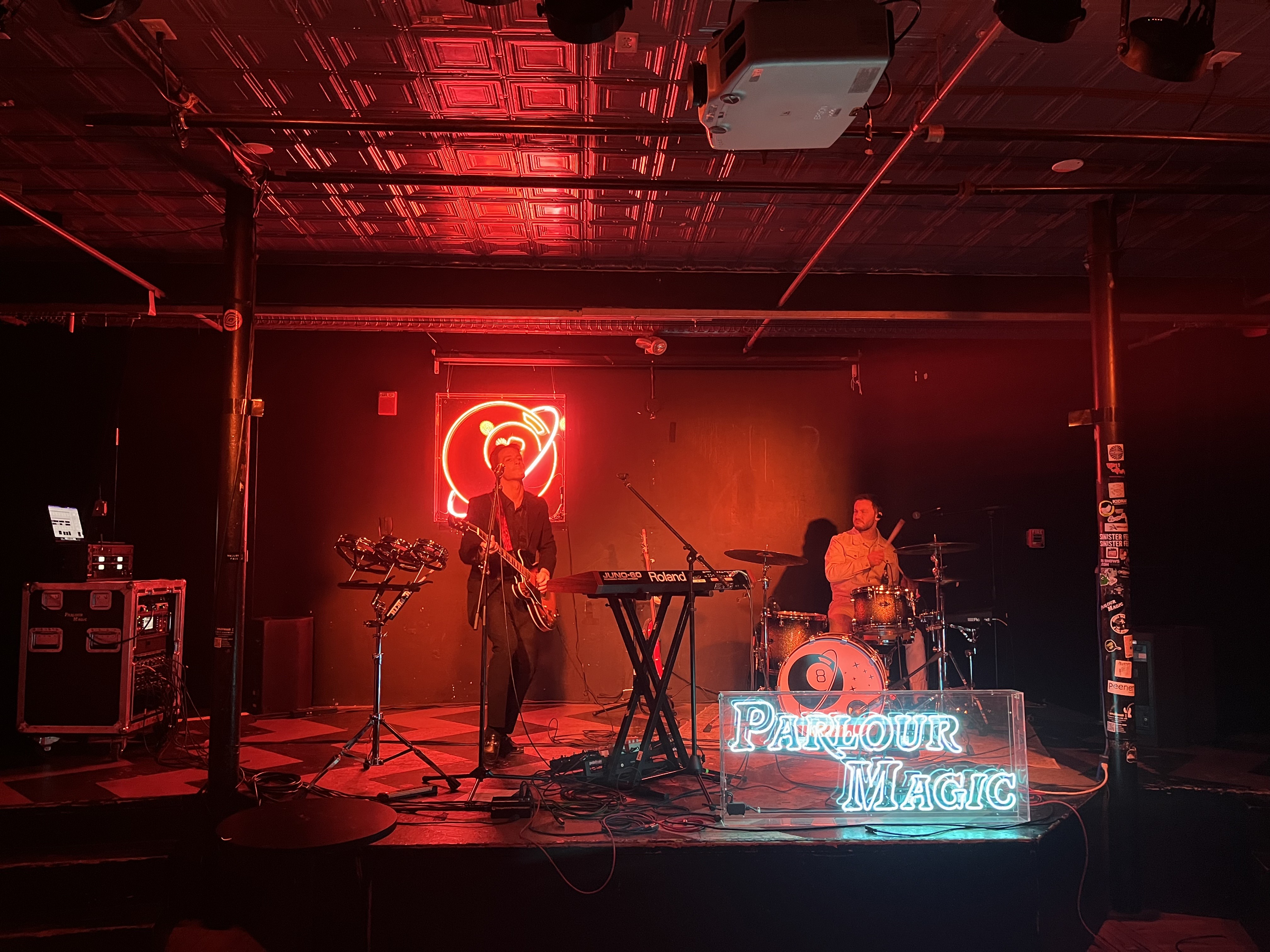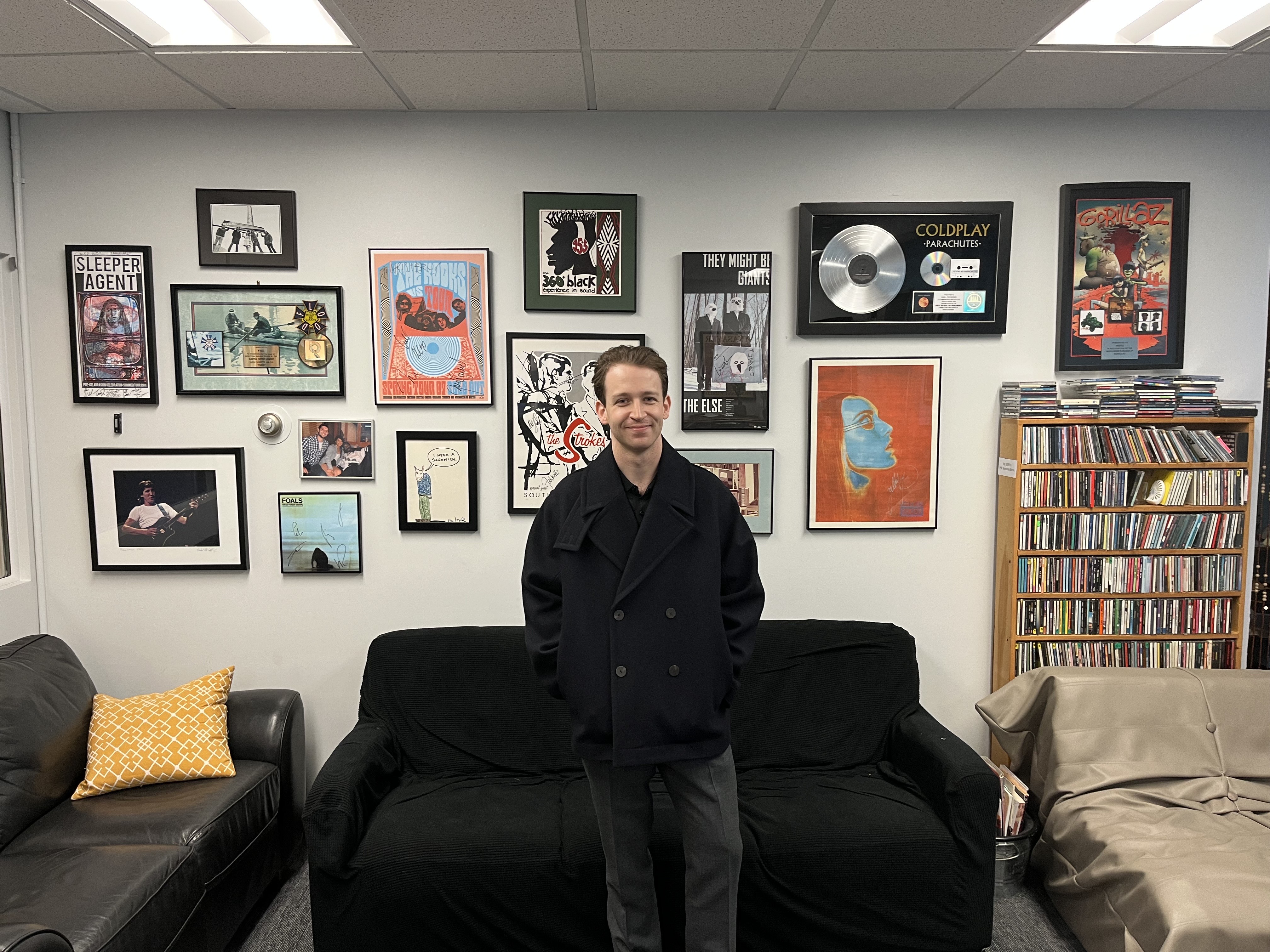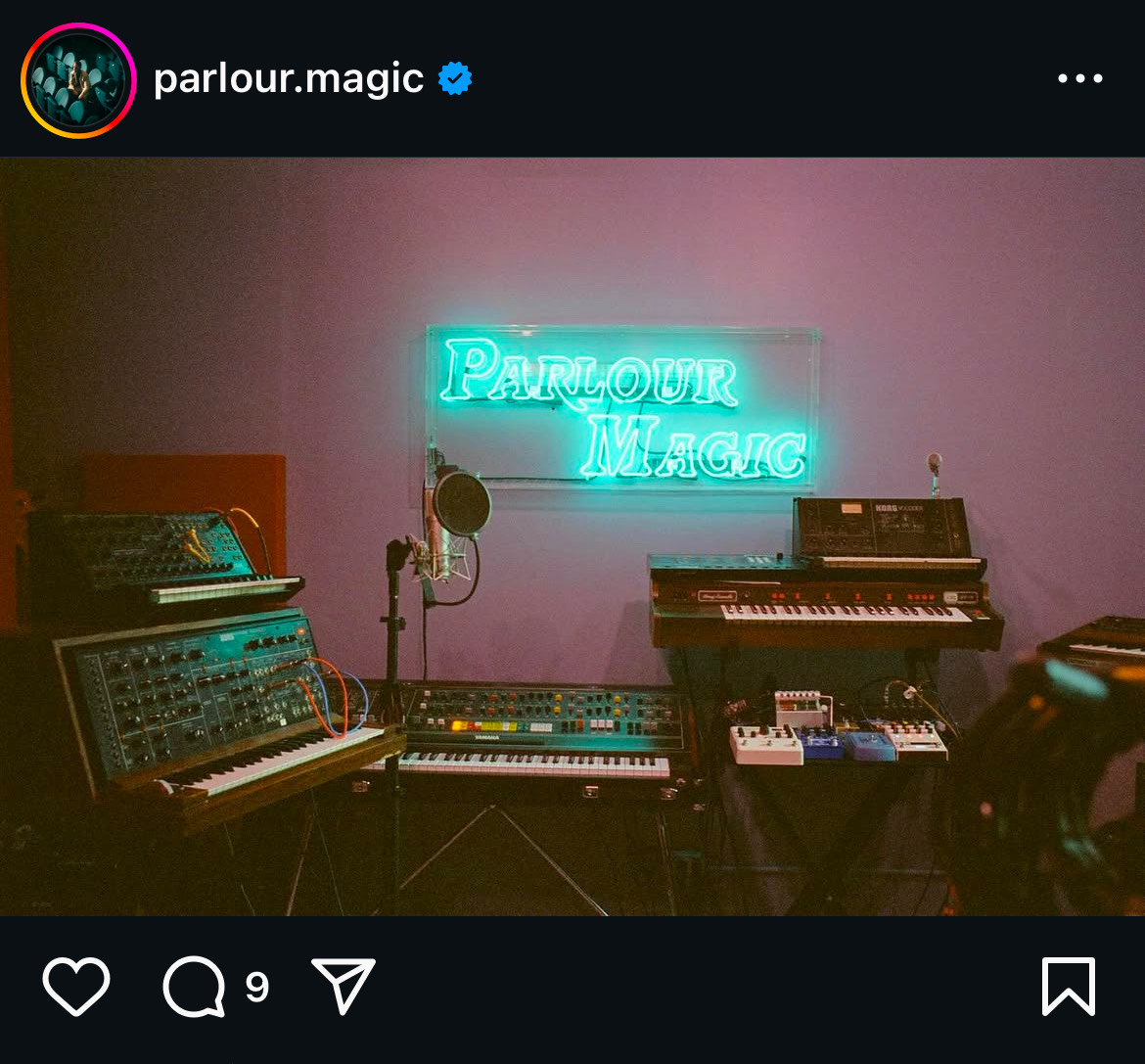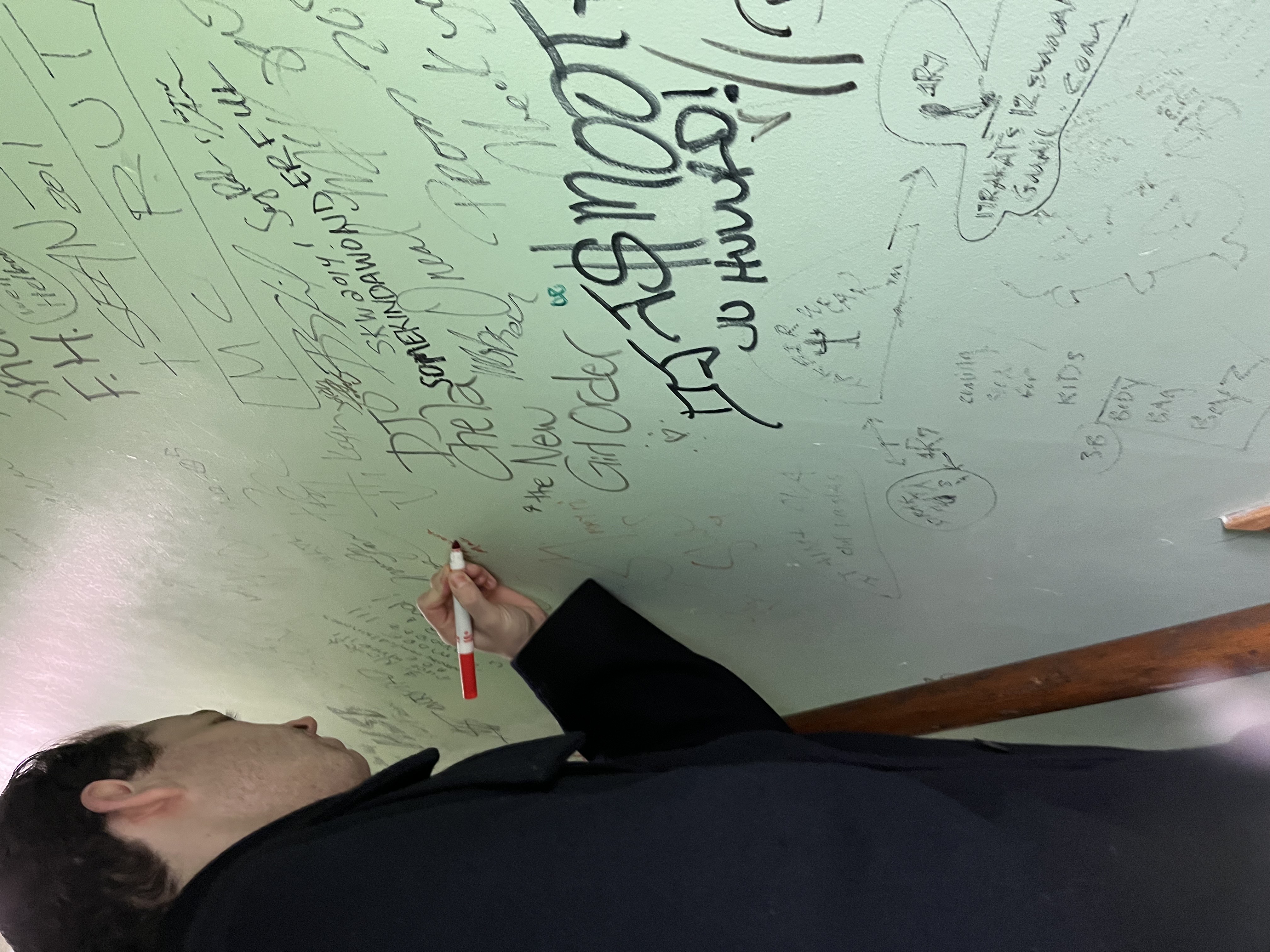Germany, Clocks, and Juno 60s: A Conversation with Parlour Magic

Words: Ozzy Wagenseil
January 12th 2025
On December 12th, 2024, AS220 was lucky enough to host the Providence debut of Parlour Magic! Headed by Luc Bokor-Smith, a producer and media artist who graduated from Brown University, and backing musicians Oren Levin and Erez Levin, Parlour Magic is a synth-pop trio hailing from New York City out of Flux Studios. Their most recent album, Saturn Return, was just released a few months ago, with production from Luc and Fab Dupont, a long-time friend and collaborator. Through all their 80s-inspired piano riffs and melodic vocal lines, they have had an esteemed tour throughout the Northeast and are now set to play along the West Coast. The afternoon before the show, I had the lovely opportunity to talk with Luc about his love for Providence, the production of his most recent album, and how he feels about synth-pop in present-day music.
O: All right. Parlour Magic. Singer. Songwriter. Producer. Synth enthusiast. Brown alum. With honors. On October 18th, you released Saturn Return, your second full-length album, following your debut in 2020 with The Fluid Neon Origami Trick and your 2021 EP Hydrogen Palace. Now on the Saturn Return Tour, you are set to play tonight at AS220. I think there's only one right question to ask – how are you doing?
PM: We're doing great. This has been the most fun week of our lives, I think. We're just starting to tour. We played New York a handful of times. I did solo as Parlour Project a few years ago, and in the past few months, we've done shows in New York as a band. But I hadn't played out of New York until Philadelphia last week. And it's been really fun. It's been cool meeting and seeing people come to shows that I'd connected with on Instagram or whatever and you get to put a face to the name, hug them and be like “Thank you.” It's just been a special week. So I'm doing great.
O: And you are set to play in Boston two days from now?
PM: Boston's on Saturday.
O: As I just mentioned, you are a Brown alum and spent quite a bit of time in Providence over four years. How are you feeling being back here for the city debut?
PM: I'm, genuinely, so happy to be here. The most exciting part about it is, as you mentioned, we play Boston on Saturday. So, I have a day off here on Friday. I did that sort of by design because I've driven through Providence and stopped to eat at Baja's over the past couple of years. But I haven't spent a night here since before the pandemic. So just being back, you forget how beautiful a city it is. I mean walking down Benefit Street just now was like, “This is the best.”
O: Alright, now for a basic question. It's quite rare that I have the opportunity to come across a synth-pop act like yourself. But, I wanted to ask, how did that ringing synth note inspire you to create Parlour Magic?
PM: The ringing synth note, good question. Some of it happened here. I've always been interested in drum machines and synthesizers. I was a guitarist growing up. That was my first instrument. It’s still kind of the only one I'm even decent at. At some point when I was still at Brown, I got an old synthesizer called the Juno 60. That day I remember pretty clearly, That kind of changed things for me. I'd played keyboards and I'd had little synths before, but getting that… It's a kind of unique synthesizer from the 80s. It's very easy to use, but you can do a lot with it, and it's really hard to get it to sound bad. And for someone who's not a great keyboardist, I was able to just get these tones that were like, “Okay, I can write songs based on this.” And that was when I started writing music. I'd produced for other people. But that was kind of the impetus, I think, to begin writing things that I would eventually then sing over.
O: While I was doing research and listening to Saturn Return, I happened to notice a common theme throughout the album. I'm just reading a few quotes here from some of the different tracks. “Clocks flying down the walls.” From “Seven Gardens.” “Broken clocks and faded memories.” From “Magdalena Room.” “Broken clocks falling from ceilings.” Finally, from “Paloma.” Plus, I also just couldn't help but notice the shot of the clock in the Super 8 audio video that you posted on your YouTube channel. And I just want to ask, what does time or clocks mean to you and for this record?
PM: What does it mean to me? Making this album took a really long time. It took three years. And there were periods of intense work. There were periods when I wasn't doing anything. And then there were periods where I was completely focused on other things, and it was this weird kind of experience. Time felt fluid throughout the making of this album. As I was writing, there was a surreal quality to it. It felt like it existed outside of my life. There was a point at which I didn't even think it was going to get finished. It was a very hard album to make. There was a point in the middle of 2023 where I almost went, “Let's start again.” But that didn't feel like the right move, which is why we're here. But I think that the time thing just comes from the feeling of time passing as you get older. I think that by the time you're 27, 28, 29, you can't get away with it – you're an adult. You can't catch yourself in your early 20s nonsense anymore. So coming out of the pandemic, I found myself thinking “Ah, I'm an adult!” And then there's the whole Saturn return thing, which I don't know if you're familiar with the term.

O: From my homework, I just know it's the position of the planet when you're born.
PM: So Saturn moves in 27-29 year cycles. So sometime between your 27th and 30th birthday, Saturn returns to where it was when you were born. And that in astrological circles, which I'm not a part of, but I think it's a useful device, that recognizes a meaningful new page in your life. It's a new chapter. Of course, you have another one around middle age and another one when you're about 84. And I think it's interesting to think about taking the step from one chapter into another. That's another sort of theme that you'd see, like in the album. There are lines about thresholds, borders, windows, doorways, and that kind of thing. And I think that those things are closely tied together, at least in my mind.
O: So it's clear to me that Saturn Return was a dedicated project of yours and Fab Dupont. While l I do want to ask about specific techniques, or how you produced the album, I think it's also important to know where you worked on this album. From each city, can you tell me how New York, Las Vegas, and Berlin contributed to your record?
PM: Really good question. Parlour Magic has always been this weird product of Las Vegas. I made the first record there in 2020. I was there for six weeks and came home right before everything happened. I was actually going to go back in April and that obviously never happened. So the first album – It has Vegas. It is an album about Las Vegas, basically. When I was starting this one, I kind of figured it just seemed a good idea to pick up where I left off. I went back in early 2022. And I was there for three weeks in April and three weeks in July. I wrote a whole bunch of stuff there. Ninety-nine percent of which didn't make the album. But it was the beginning of the process. “All right, I'm going to make the next Parlour Magic record, this is what I'm doing.” Then I came back to New York and I was working on my own through 2022.
I decided towards the end of 2022 that I wanted to go work with my vocal producer, Luca Chesney, who was based in Berlin. I spent three weeks at this amazing place called Funkhaus in Berlin. It's legendary. It used to be the East German radio broadcasting station. Now it's a recording studio. We were joined by this guy Florian Stepper who ended up playing guitar and bass on a number of the songs on the album. He's a friend of mine now, but I didn't know him at the time. He's a great producer too. So in Berlin, those songs grew up. I absolutely hear the Berlin influence on the songs, knowing what they were when we went in. “Paloma” became a lot more distorted and dark. It was also the middle of January. The entire month of January 2023, it was raining and dark all the time. I think the sun came out once. I think that worked with the songs, and it left a real sonic impression on everything we were working on at that time.
And then, New York. After Berlin, I had a hard time figuring out how to finish it. It was ninety… no, seventy-five percent of the way done for almost all of 2023, and I couldn't figure out what it needed. So I called someone I trust, Fab. He's a mentor to me, and he mixed my first record. He owns Flux, which is where I work, so I'm basically in his house every day. I went to him and I said, “Fab, I need help. Let's do this together.” We made the album together in the end. From January to late April of this year, we were together basically five days a week, working on the songs, and turning them inside out. Sometimes it was quite painful. Sometimes I thought “I don't know if this is right.” That was an amazing learning experience though because I'd never done that with someone before. I'd worked, I'd produced other people, but I'd never been produced before. I didn't realize how painful it could be to have someone be like, “Well, this chorus is gone.” And I'm like, “But it's so good!” And then you realize, “No, the song's better now.” It was an amazing experience. His resume speaks for itself, but he's also just kind of the best guy you'll ever meet. He’s patient and warm and I think he really understood what I was going for. That is all you can ask for in a producer. So working together to sort of cap this thing off was…amazing.
O: Now diving deep into the record, my personal favorite is “The Readout.” I'm a big fan of the altered voices you do. “Saw you leaving town.” and “Heard you hit the ground.” Those vocoded vocals on the chorus. Growing up, I loved the theme of altered voices. Daft Punk and Stevie Wonder were the two big names when it came to vocoded stuff. Peter Frampton did that too with his guitar. However, I'm not trying to imply these were your inspirations too, but I'm wondering, how do autotune and voice alteration play a role in your music?
PM: A hundred percent. It's part of my identity. To be honest, I think it was born of insecurity. I'm not a singer, I was never a singer, and I never considered myself to be a singer. So when I did start singing, I think that my instinct was to hide behind that kind of stuff. The first album, you hear that. I think that on the first album, I'm using autotune out of insecurity, and on this one I'm using it stylistically. I think I became a better singer between the two. I took vocal lessons. I kind of tried to do it right this time. I'm a better singer now than I was when I made the first record, but I am very cognizant of the fact that the sound of Parlour Magic is that super tight vocal, with some of the more overt vocoder stuff, like the robots that you hear on “The Readout” or “Seven Gardens.” That's the answer, I think. It came from a place of not trusting myself. It did lead me down a path that works in moderation.
O: So, I know that we're talking about music, but I also do want to talk a little bit about your multimedia approach to different things. While you were attending Brown, you created installations like node-558, CHANCE, 8.field, and my personal favorite, sad mac. I know I say that when I've never seen these installations before in person, but I would love to at some point.
PM: I'd love to do them again.
O: And the Super 8 music video was just awesome. My favorite shots were of you with the old-school computer monitors and the little oscilloscope projecting the face. It's so retro.
PM: I appreciate it. Honestly, the video is a total credit to Lloyd Lennox, who's the director. And David Rockoff, who's the cinematographer. They just did an amazing job. Like what I was saying about Fab earlier, I met with Lloyd right as I was finishing the album. I said, “I want to do something with this song “Super 8.” And he just got it. He got the project, he got me, he got the song, and it was a collaborative thing. We worked together to come up with that video and all that. Ultimately, the execution of it all and how good it looks falls on them entirely. But it was a total pleasure doing it. I'd love to do another video.
O: With all these multimedia exhibitions you posted while you were at Brown, reflecting now, are there still those artistic values that you had when creating those projects that you carry forward now with Parlour Magic?
PM: Totally. Music, at least the way I consume it, has never just been audio. I think that from the very beginning, before it was called Parlour Magic, I was inspired by visuals. I'm inspired where I am, or things that I imagine in my mind, and I think that tends to come across on the record. So for me, they're kind of just tied together. The visual idea of the album is usually being born as I'm working on it. I know what this song wants to look like. So with “Super 8”...I knew the lead single was going to be called Super 8. I bought an old Super 8 camera on eBay during the sessions with Fab, and I was just filming stuff, just to have a fun thing. And then I realized, “Well, this actually looks pretty cool. So let's commit to it.” And since then we've done all the promo videos and the music videos. All were shot on film. On 8mm and 16mm. And that's been this second project. Once the album was done, I got to do this whole thing. And it feels like I'm back doing the stuff I was doing at Brown. Thinking about it from a visual perspective, I won't say it's as gratifying as writing music, but I'm so glad that I still get to do that. Because if I didn't, I'd miss it so much.
O: Continuing on media, I'm a big fan of your website, design, Instagram, and the overall branding of Parlour Magic. I just love the grainy pictures and the details of the “Super 8” music video. The changing ratio aspects between different shots and all. Plus, I'm a big fan of your first-ever Instagram post.
PM: *laughs* I mean, that's a film photo that I took of the studio. Literally, that was the room that Fab and I were working in. That's my room at Flux. I still work out of there.
O: Can I ask what kind of synthesizers are here?

PM: Let's do it. Let's go left to right. The big one on the bottom left there, that's a really rare synth called the Korg PS 3100. It's a semi-modular synth made in the mid-to-late 70s by Korg. And what it's talking to up top is a monophonic version of it called the MS 20. That's a much more common synth. Those have been reissued. The PS3100 is rare for a million reasons, and they only made a couple hundred of them. The architecture of it is unique. You don't see a synthesizer made the way that that was made. And the tones that it yields are just crazy and otherworldly. All of which can also be said about that giant synth in the middle there. That is the Yamaha CS80, which is a pretty legendary synth. It's pretty insane that I have one in my room at Flux. Thanks, Fab. That synth was the soundtrack to Blade Runner. Vangelis used it. So Chariots of Fire and Blade Runner. Also the intro to “Africa”. It also has a pretty unique architecture. It has what's called polyphonic aftertouch, meaning that you can play a chord and then express different notes differently than how hard you press the instrument. It’s not exciting as it was in the mid-70s. But it was the only synth that did that for like 20 years. And it just sounds ridiculously good. To the right, we have a Salina. Originally made by a company called Eminent in the Netherlands, but licensed to the American company ARP, Alan R. Perlman. He also made the ARC 2600, which is another famous synth. It's a basic synthesizer. They call it the Salinas String Ensemble because it sounds like strings. Think like 70s Italian horror. That kind of thing. On top of that is a Korg vocoder. We're using one of those on stage. We have a Korg vocoder on stage for the vocoder lines that you mentioned. Like in “The Readout.” Poking off to the right there is a Prophet 5, which is a classic American synth from the late 70s.
O: And then you also got like a little pedal board.
PM: Yeah. None of those are mine. We just pulled from Flux’s pedal collection for things that would help the album. I know that that's a Mercury Seven because that's mine. It’s a reverb pedal and it’s great. That is a Chroma console, which is a cool multi-effects pedal that Fab got for the record. And that's an electron drive distortion of some kind. That's a tube distortion of some kind. And I have no clue what that is. That's pretty much everything in that picture.
O: I'm assuming the website was also shot with a Super 8 camera?
PM: Yeah, all of that's B roll from Berlin. Basically, anything that I'm not in, I shot. Anything I am in, whoever I was with at the time shot. That was when we were in Berlin to film the Super 8 video. And to get the record mastered. And so I was there for about a week and a half doing various things. We did photo shoots there and that kind of thing. And just like I normally do, I kept the Super 8. Kept that thing on me.
O: When taking all this together, the website, the different pictures, Instagram, everything, how do you envision yourself to new listeners checking out Parlor Magic? And how do Max Hardman and Connor Cowden support that vision?
PM: Good question. So Max did the photos in Berlin, and he just did an amazing job. He's just an amazing photographer. Connor has been my longtime designer, so he does all the graphic design. I genuinely joke that all of the good little ideas are Connor’s. He deserved a pretty big credit on the Super 8 video. He was the one who tied the story together when we couldn't. He refuses to show up to meetings. But if I'm just sitting with him on the couch and I'm like, “Yeah, I don't know about this thing,” He's like, “Oh, just do that.” He's one of my best friends, and he’s been around before Parlour Magic was Parlour Magic. He really gets what it is. Lately, he's been churning out these unbelievable concert posters, which I'm pretty excited about because I think they're cool as hell. All of the Parlour Magic world-building stuff, so much of that is just Connor being like “Oh, you should do this.”
O: Now we got a fun little segment. We got some rapid question time. Answer with the first thing that comes to your head when you hear these questions.
PM: Let's do it.
O: Favorite synth to play with?
PM: Juno 60.
O: If you could time travel to a decade, which one would you travel to?
PM: Late 70s.
O: What's a lyric that stands out to you the most?
PM: Of mine?
O: Any lyric.
PM: “The room is on fire while she's fixing her hair.”
O: Reverb or delay?
PM: Delay.
O: If you could talk to one, what would you ask a bear?
PM: ...How are you really?
O: Have you ever seen a clock melt?
PM: Not in reality.
O: Thoughts on lasers?
PM: Great.
O: Cool. What is your most listened-to song right now?
PM: Do you want the honest answer? I'm on a huge Coheed and Cambria kick right now. Every three years, they're the only band I listen to for two weeks. I just have this thing. Their whole Good Apollo record. That's not a cool answer though. A cooler answer would be “Only Love Can Break Your Heart” by Saint Etienne, because it's on our pre-show playlist, and I hear it every day.
O: Was there one Coheed and Cambria song?
PM: “Welcome Home.”
O: Final question: thoughts about rapid question time?
PM: I'm sad it's over.

O: Unfortunately, I think we're nearing the end of the interview. However, I do have one last question, and this is more general. Concerning your work over the past four or five years that you've been Parlour Magic, and the overall pop culture revolving around the synth sound, from the Stranger Things opening synth track to a song like “Blinding Lights” by The Weeknd, the latter becoming the highest charting song of the past decade alone…
PM: It's an amazing song.
O: How do you think the synth movement will continue in the future?
PM: You're right that it's having a moment. Or maybe it had a moment, maybe it's over. But moments don't last. And I don't expect it to. Luckily I'm in a position where I don't feel the need to…care is the wrong word, because that sounds flippant. We don't need the pop kids. That's not our target audience, you know? And it's great that Synthpop had a moment. “Blinding Lights.” In all seriousness, I think it’s one of the best pop songs ever written. The next Parlour Magic Record is gonna be whatever it is gonna be, regardless of what's going on in current pop culture, If not, something's gone wrong. It's nice to see music that you personally like being represented in the charts. Yeah, it's great that that big Juno line in Blinding Lights was the thing in all of 2020 or 19 or whatever that was. It's great.
Parlour Magic is still on tour! Right now, you can catch them soon in Tucson, San Diego, and other cities on the West Coast from January 13th to the 24th!
